- Home
- Julia Quinn
The Sum of All Kisses Page 10
The Sum of All Kisses Read online
Page 10
“You’re making that up,” Frances said instantly.
He shrugged. “Feel free to check the answer yourself.”
“I can’t very well do so here.”
“Then you’ll have to take my word for it, won’t you?”
“As long as you realize that I could check your answer if I had the proper supplies,” Frances said pertly. Then she frowned. “Did you truly figure that out in your head?”
“I did,” he confirmed. He took another bite of cake. It really was quite tasty. The icing seemed to have been flavored with actual lavender. Marcus had always liked sweets, he recalled.
“That’s brilliant. I wish I could do that.”
“It occasionally comes in handy.” He ate more cake. “And sometimes does not.”
“I’m very good at maths,” Frances said in a matter-of-fact voice, “but I can’t do it in my head. I need to write everything down.”
“There’s nothing wrong with that.”
“No, of course not. I’m much better than Elizabeth.” Frances gave a lofty smile. “She hates that I am, but she knows it’s true.”
“Which one is Elizabeth?” Hugh probably should have remembered which sister was which, but the memory that captured every word on a page was not always so dependable with names and faces.
“My next oldest sister. She is occasionally unpleasant, but for the most part we get on well.”
“Everyone is occasionally unpleasant,” he told her.
That stopped her short. “Even you?”
“Oh, especially me.”
She blinked a few times, then must have decided she preferred the earlier strain of conversation, because when she opened her mouth again it was to ask, “Do you have any brothers or sisters?”
“I have one brother.”
“What is his name?”
“Frederick. I call him Freddie.”
“Do you like him?”
Hugh smiled. “Very much so. But I don’t get to see him very often.”
“Why not?”
Hugh didn’t want to think about all the reasons why not, so he settled on the only one that was suitable for her ears. “He doesn’t live in London. And I do.”
“That’s too bad.” Frances poked her fork in her cake, idly smearing the icing. “Perhaps you can see him at Christmas.”
“Perhaps,” Hugh lied.
“Oh, I forgot to ask,” she said. “Are you better at arithmetic than he is?”
“I am,” Hugh confirmed. “But he doesn’t mind.”
“Neither does Harriet. She’s five years older than I am, and I’m still better than she is.”
Hugh gave a nod, having no other reply.
“She likes to write plays,” Frances continued. “She doesn’t care about numbers.”
“She should,” Hugh said, glancing back out at the wedding celebration. Lady Sarah was now dancing with one of the Bridgerton brothers. The angle was such that Hugh could not be sure which one. He recalled that three of the brothers were married, but one was not.
“She’s very good at it,” Frances said.
She is, Hugh thought, still watching Sarah. She danced beautifully. One could almost forget her waspish mouth when she danced like that.
“She’s even putting a unicorn in the next one.”
A uni— “What?” Hugh turned back to Frances, blinking.
“A unicorn.” She gave him a frighteningly steady look. “You are familiar with them?”
Good Lord, was she poking fun at him? He’d have been impressed if it wasn’t so patently ridiculous. “Of course.”
“I’m mad for unicorns,” Frances said with a blissful sigh. “I think they’re brilliant.”
“Nonexistently brilliant.”
“So we think,” she replied with suitable drama.
“Lady Frances,” Hugh said in his most didactic voice, “you must be aware that unicorns are creatures of myth.”
“The myths had to come from somewhere.”
“They came from the imaginations of bards.”
She shrugged and ate cake.
Hugh was dumbfounded. Was he really debating the existence of unicorns with an eleven-year-old girl?
He tried to drop the matter. And found he could not. Apparently he was debating the existence of unicorns with an eleven-year-old girl.
“There has never been a recorded sighting of a unicorn,” he said, and to his great irritation, he realized that he sounded as prim and stiff as Sarah Pleinsworth had when she’d been all snippy about his plans to shoot targets with her cousin.
Frances lifted her chin. “I have never seen a lion, but that doesn’t mean they don’t exist.”
“You may have never seen a lion, but hundreds of other people have done.”
“You can’t prove that something doesn’t exist,” she countered.
Hugh paused. She had him there.
“Indeed,” she said smugly, recognizing the exact moment he’d been forced to capitulate.
“Very well,” he said, giving her an approving nod. “I cannot prove that unicorns don’t exist, but you cannot prove they do.”
“True,” she said graciously. Her mouth pursed and then did an unnerving little twist. “I like you, Lord Hugh.”
For a second she sounded exactly like Lady Danbury. Hugh wondered if he ought to be afraid.
“You don’t speak to me as if I were a child,” she said.
“You are a child,” he pointed out. She’d used the subjunctive form of “to be,” which would imply that she wasn’t actually a child.
“Well, yes, but you don’t speak to me as if I were an idiot.”
“You’re not an idiot,” he said. And she’d used the subjunctive correctly that time. But he didn’t make mention of that.
“I know.” She was starting to sound somewhat exasperated.
He stared at her for a moment. “Then what is your point?”
“Just that— Oh, hullo, Sarah.” Frances smiled over Hugh’s shoulder, presumably at the current bane of his existence.
“Frances,” came the now familiar voice of Lady Sarah Pleinsworth. “Lord Hugh.”
He stood, even though it was awkward, with his leg.
“Oh, you don’t need to—” Sarah began.
“I do,” Hugh cut in sharply. The day he could no longer rise to his feet in the presence of a lady was— Well, quite honestly he did not want to ponder it.
She gave a tight—and possibly embarrassed—smile, then walked around him to sit in the chair on the other side of Frances. “What were the two of you talking about?”
“Unicorns,” Frances answered promptly.
Sarah’s lips came together in what appeared to be an attempt to maintain a straight face. “Really?”
“Really,” Hugh said.
She cleared her throat. “Did you reach any conclusions?”
“Just that we must agree to disagree,” he said. He added a placid smile. “As so often occurs in life.”
Sarah’s eyes narrowed.
“Sarah doesn’t believe in unicorns, either,” Frances said. “None of my sisters do.” She gave a sad little sigh. “I am quite alone in my hopes and dreams.”
Hugh watched Sarah roll her eyes, then said, “I have a feeling, Lady Frances, that the only thing you are alone in is being showered with the love and devotion of your family.”
“Oh, I’m not alone in that,” Frances said brightly, “although as the youngest, I do enjoy certain benefits.”
Sarah made a snorting sound.
“It’s true, then?” Hugh murmured, looking her way.
“She would be quite dreadful if she weren’t so innately marvelous,” Sarah said, smiling at her sister with obvious affection. “My father spoils her abominably.”
“He does,” Frances said happily.
“Is your father here?” Hugh asked curiously. He did not think he’d ever met Lord Pleinsworth.
“No,” Sarah replied. “He deemed it too far a journey from Devo
n. He rarely leaves home.”
“He doesn’t like to travel,” Frances put in.
Sarah nodded. “He’ll be at Daniel’s wedding, though.”
“Is he bringing the dogs?” Frances asked.
“I don’t know,” Sarah replied.
“Mama will—”
“—kill him, I know, but—”
“Dogs?” Hugh cut in. Because really, it had to be asked.
The two Pleinsworth sisters looked at him as if they’d quite forgotten he was there.
“Dogs?” he repeated.
“My father,” Sarah said, delicately picking her way across her words, “is rather fond of his hounds.”
Hugh glanced over at Frances, who nodded.
“How many dogs?” Hugh asked. It seemed a logical question.
Lady Sarah appeared reluctant to admit to a number, but her younger sister had no such compunctions. “Fifty-three at last count,” Frances said. “But it’s probably more by now. They’re always having puppies.”
Hugh failed to locate an appropriate response.
“Of course he can’t fit them all in one carriage,” Frances added.
“No,” Hugh managed to reply. “I don’t imagine he could.”
“He has often said that he finds animals to be better company than humans,” Sarah said.
“I cannot say that I disagree,” Hugh said. He saw Frances open her mouth to speak and quickly silenced her with a pointed finger. “Unicorns do not count.”
“I was going to say,” she said with feigned affront, “that I wish he would bring the dogs.”
“Are you mad?” Sarah demanded, right as Hugh murmured, “All fifty-three of them?”
“He probably wouldn’t bring them all,” Frances told Hugh before turning to Sarah. “And no, I’m not mad. If he brought the dogs, I’d have someone to play with. There are no other children here.”
“You have me,” Hugh found himself saying.
The two Pleinsworth sisters fell utterly silent. Hugh had a feeling that this was not a common occurrence.
“I suspect you’d have a difficult task recruiting me for a game of Oranges and Lemons,” he said with a shrug, “but I’m happy to do something that does not require much use of my leg.”
“Oh,” Frances said. She blinked a few times. “Thank you.”
“This has been the most entertaining conversation I’ve had at Fensmore,” he told her.
“Really?” Frances asked. “But hasn’t Sarah been assigned to keep you company?”
There was a very awkward silence.
Hugh cleared his throat, but Sarah spoke first. “Thank you, Frances,” she said with great dignity. “I appreciate your taking my place at the head table while I danced.”
“He looked lonely,” Frances said.
Hugh coughed. Not because he was embarrassed, but because he was . . . Bloody hell, he didn’t know what he was feeling just then. It was damned disconcerting.
“Not that he was lonely,” Frances said quickly, shooting him a conspiratorial glance. “But he did look so.” She glanced back and forth between her sister and Hugh, apparently only just realizing she might be caught in the middle of an uncomfortable moment. “And he needed cake.”
“Well, we all need cake,” Hugh put in. He could not have cared less if Lady Sarah was put out, but there was no need for Lady Frances to feel ill at ease.
“I need cake,” Sarah announced.
It was just the thing to move the conversation forward. “You haven’t had any?” Frances asked in amazement. “Oh, but you must. It’s absolutely brilliant. The footman gave me a piece with extra flowers.”
Hugh smiled to himself. Extra flowers, indeed. The decorations had turned Lady Frances’s tongue purple.
“I was dancing,” Sarah reminded her.
“Oh, yes, of course.” Frances pulled a face and turned to Hugh. “It is another great sorrow of being the only child at a wedding. No one dances with me.”
“I assure you I would,” he said in all seriousness. “But alas . . .” He motioned to his cane.
Frances gave a sympathetic nod. “Well, then, I’m very glad I was able to sit with you. It’s no fun sitting alone while everyone else is dancing.” She stood and turned to her sister. “Shall I get you some cake?”
“Oh, that won’t be necessary.”
“But you just said you wanted some.”
“She said she needed some,” Hugh said.
Sarah looked at him as if he’d sprouted tentacles.
“I remember things,” he said simply.
“I’ll get you cake,” Frances decided, and walked off.
Hugh entertained himself by counting to see how long it would take for Lady Sarah to cut through the silence and speak to him after her sister departed. When he reached forty-three seconds (give or take a few; he didn’t have a timepiece for a truly accurate measure) he realized that he was going to have to be the adult of the duo, and he said, “You like to dance.”
She started, and when she turned to him, he realized instantly from her expression that while he had been measuring an awkward pause in the conversation, she had merely been sitting in companionable silence.
He found this strange. And perhaps even unsettling.
“I do,” she said abruptly, still blinking with surprise. “The music is delightful. It really does make one stand up and— I beg your pardon.” She flushed, the way everyone did when they said something that might possibly refer to his injured leg.
“I used to like to dance,” he said, mostly to be contrary.
“I— ah—” She cleared her throat. “Ehrm.”
“It’s difficult now, of course.”
Her eyes took on a vague expression of alarm, so he smiled placidly and took a sip of his wine.
“I thought you did not drink in the presence of the Smythe-Smiths,” she said.
He took another sip—the wine was quite good, just as she’d promised the night before—and turned to her with every intention of responding with a dry jest, but when he saw her sitting there, her skin still pink and dewy from her recent exertions, something turned within him, and the little knot of anger he worked so hard to keep buried burst forth and began to bleed.
He was never going to dance again.
He was never going to ride a horse or climb a tree or stride purposefully across a room and sweep a lady off her feet. There were a thousand things he’d never do, and you’d think it would have been a man who’d reminded him of this—an able-bodied man who could hunt and box and do all those bloody things a man was meant to do, but no, it was her, Lady Sarah Pleinsworth, with her fine eyes and nimble feet, and every bloody smile she’d bestowed upon her dance partners that morning.
He didn’t like her. He really didn’t, but by God, he’d have sold a piece of his soul right then to dance with her.
“Lord Hugh?” Her voice was quiet, but it held a tiny trace of impatience, just enough to alert him that he’d been silent for too long.
He took another sip of his wine—more of a swig this time, really—and said, “My leg hurts.” It didn’t. Not much, anyway, but it might as well have done. His leg seemed to be the reason for everything in his life; surely a glass of wine was no exception.
“Oh.” She shifted in her seat. “I’m sorry.”
“Don’t be,” he said, perhaps more brusquely than he’d intended. “It isn’t your fault.”
“I know that. But I can still be sorry that it pains you.”
He must have given her a dubious look, because she drew back defensively and said, “I’m not inhuman.”
He looked at her closely, and somehow his eyes dipped down the line of her neck to the delicate planes of her collarbone. He could see every breath, every tiny motion along her skin. He cleared his throat. She was most definitely human.
“Forgive me,” he said stiffly. “I was of the opinion that you thought my suffering was no more than I deserve.”
Her lips parted, and he could pract
ically see his statement running through her mind. Her discomfort was palpable, until finally she said, “I may have felt that way, and I cannot imagine I will ever bring myself to think charitably of you, but I am trying to be a less . . .” She stopped, and her head moved awkwardly as she sought words. “I am trying to be a better person,” she finally said. “I do not wish you pain.”
His brows rose. This was not the Sarah Pleinsworth with whom he was familiar.
“But I don’t like you,” she suddenly blurted.
Ah. There she was. Hugh actually took some comfort in her rudeness. He was feeling unaccountably weary, and he did not have the energy to figure out this deeper, more nuanced Sarah Pleinsworth.
He might not like the overly dramatic young miss who made grand and loud pronouncements, but right then . . . he preferred her.
Chapter Eight
She really could see over the entire room from up here at the head table, Sarah thought. It gave one the opportunity to stare quite shamelessly (as one did at events such as these) at the bride. The happy bride, dressed in pale lavender silk and a radiant smile. One could, perhaps, shoot dagger eyes at that happy bride (with no intention, of course, that the happy bride actually see those dagger eyes). But it was, after all, Honoria’s fault that Sarah was stuck up here, sitting next to Lord Hugh Prentice, who, after apparently having a lovely conversation with her younger sister, had turned unpleasant and surly.
“I do bring out the best in you, don’t I?” Sarah muttered without looking at him.
“Did you say something?” he asked. He didn’t look at her, either.
“No,” she lied.
He shifted in his seat, and Sarah glanced down long enough to realize that he was adjusting the position of his leg. He seemed to be most comfortable with it stretched out before him; she’d noticed that the previous night at supper. But whereas that table had been laden with guests, this one was quite empty save for the two of them, and there was plenty of room to—
“It doesn’t hurt,” he said, not turning even an inch in her direction.
“I beg your pardon?” she said, since she had not been looking at his leg. In fact, after she had noticed that he was holding it quite straight, she had been quite purposefully looking at at least six other things.

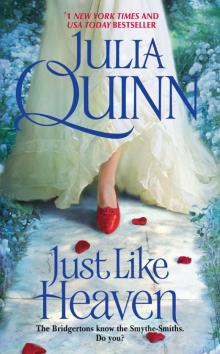 Just Like Heaven
Just Like Heaven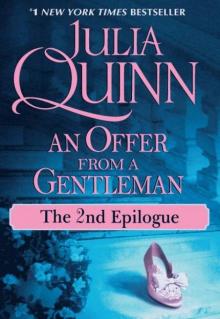 B03.2 An Offer from a Gentleman Ep II
B03.2 An Offer from a Gentleman Ep II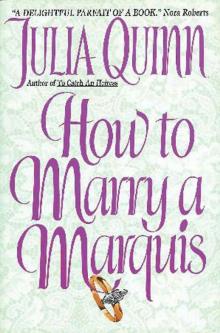 How to Marry a Marquis
How to Marry a Marquis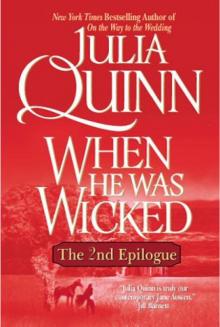 When He Was Wicked: The 2nd Epilogue
When He Was Wicked: The 2nd Epilogue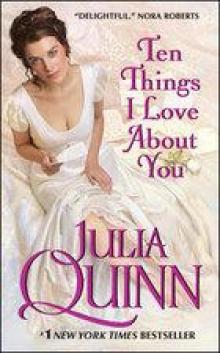 Ten Things I Love About You
Ten Things I Love About You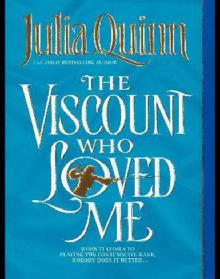 The Viscount Who Loved Me
The Viscount Who Loved Me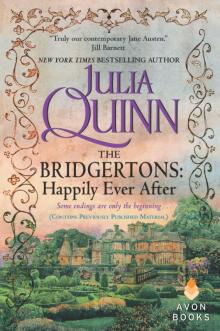 The Duke and I
The Duke and I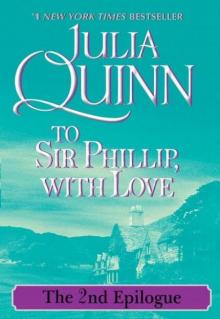 B05.2 To Sir Philip With Love Ep II
B05.2 To Sir Philip With Love Ep II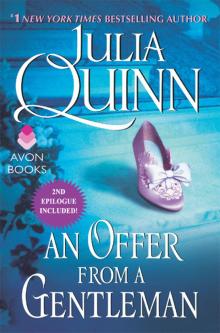 An Offer From a Gentleman: The 2nd Epilogue
An Offer From a Gentleman: The 2nd Epilogue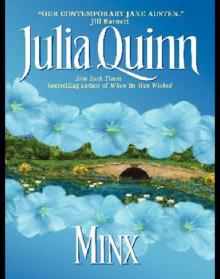 Minx
Minx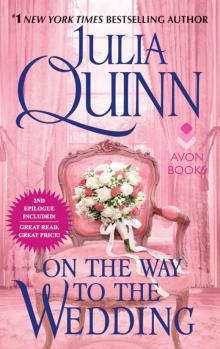 On the Way to the Wedding with 2nd Epilogue
On the Way to the Wedding with 2nd Epilogue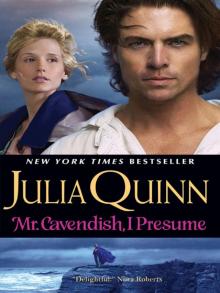 Mr. Cavendish, I Presume
Mr. Cavendish, I Presume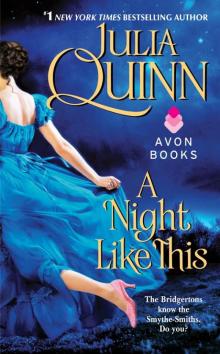 A Night Like This
A Night Like This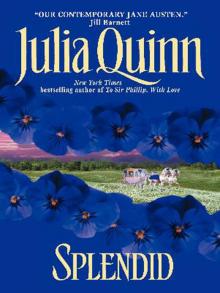 Splendid
Splendid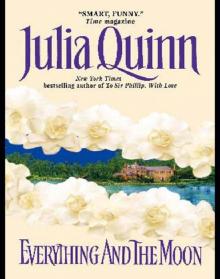 Everything and the Moon
Everything and the Moon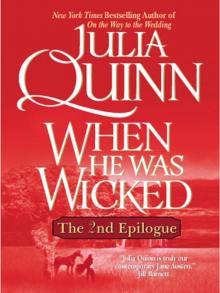 When He Was Wicked
When He Was Wicked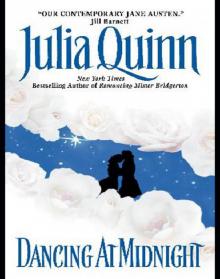 Dancing at Midnight
Dancing at Midnight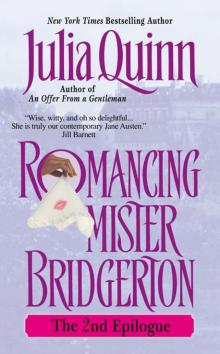 Bridgerton 04: 2nd Epilogue - Romancing Mister Bridgerton
Bridgerton 04: 2nd Epilogue - Romancing Mister Bridgerton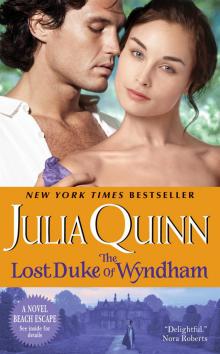 The Lost Duke of Wyndham
The Lost Duke of Wyndham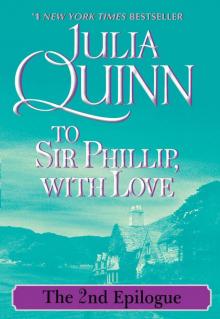 To Sir Phillip, With Love
To Sir Phillip, With Love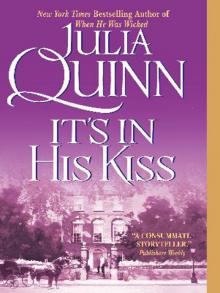 It's in His Kiss
It's in His Kiss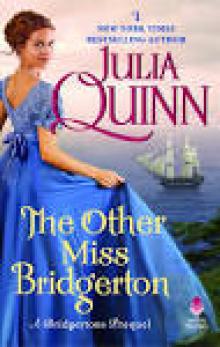 The Other Miss Bridgerton
The Other Miss Bridgerton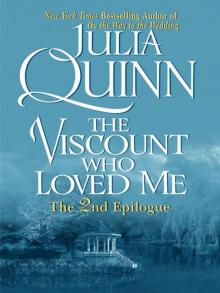 Bridgerton 02: 2nd Epilogue - The Viscount Who Loved Me
Bridgerton 02: 2nd Epilogue - The Viscount Who Loved Me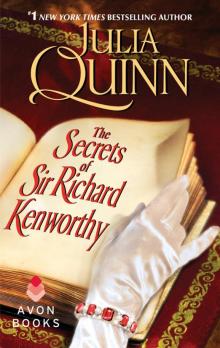 The Secrets of Sir Richard Kenworthy
The Secrets of Sir Richard Kenworthy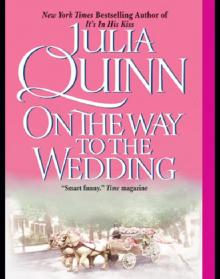 On the Way to the Wedding
On the Way to the Wedding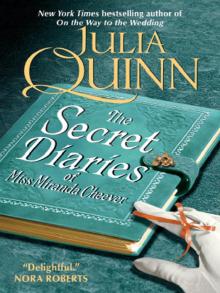 The Secret Diaries of Miss Miranda Cheever
The Secret Diaries of Miss Miranda Cheever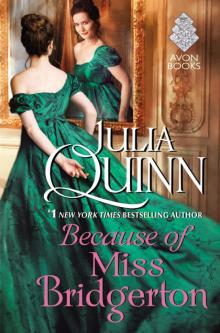 Because of Miss Bridgerton
Because of Miss Bridgerton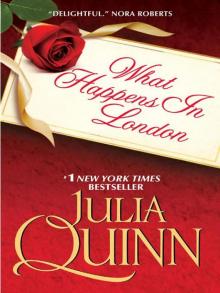 What Happens in London
What Happens in London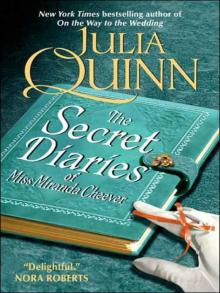 JQuinn - The Secret Diaries of Miss Miranda Cheever
JQuinn - The Secret Diaries of Miss Miranda Cheever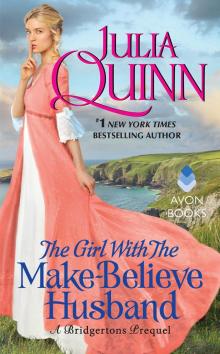 The Girl With the Make-Believe Husband
The Girl With the Make-Believe Husband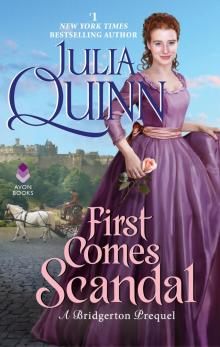 First Comes Scandal
First Comes Scandal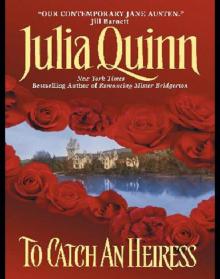 To Catch an Heiress
To Catch an Heiress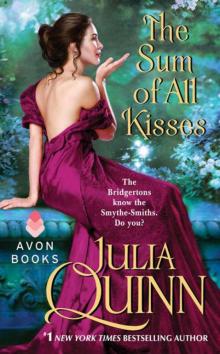 The Sum of All Kisses
The Sum of All Kisses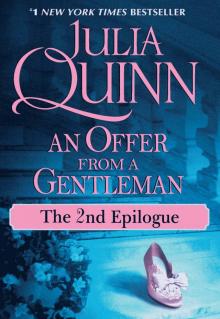 An Offer From a Gentleman
An Offer From a Gentleman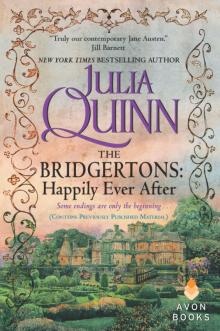 The Bridgertons: Happily Ever After
The Bridgertons: Happily Ever After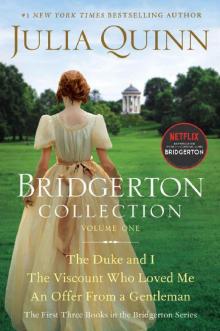 Bridgerton Collection Volume 1 (Bridgertons)
Bridgerton Collection Volume 1 (Bridgertons)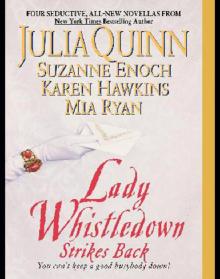 Lady Whistledown Strikes Back
Lady Whistledown Strikes Back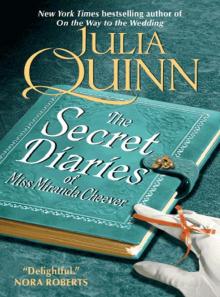 Secret Diaries of Miss Miranda Cheever
Secret Diaries of Miss Miranda Cheever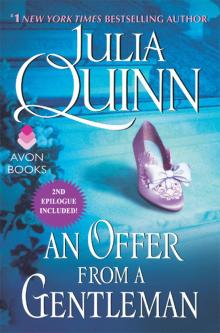 An Offer from a Gentleman with 2nd Epilogue
An Offer from a Gentleman with 2nd Epilogue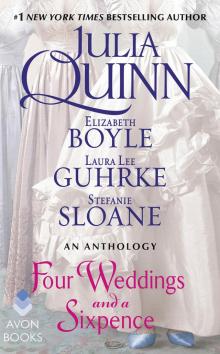 Four Weddings and a Sixpence
Four Weddings and a Sixpence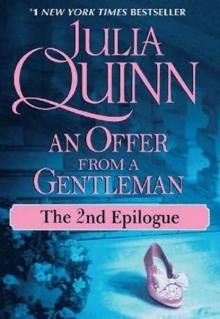 An Offer from a Gentleman: The Epilogue II
An Offer from a Gentleman: The Epilogue II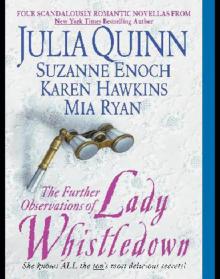 The Further Observations of Lady Whistledown
The Further Observations of Lady Whistledown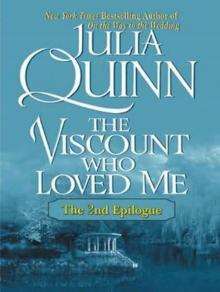 The Viscount Who Loved Me: The Epilogue II
The Viscount Who Loved Me: The Epilogue II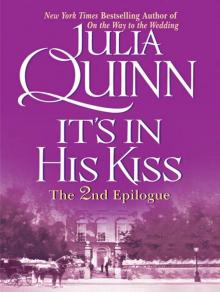 It’s In His Kiss Epilogue II
It’s In His Kiss Epilogue II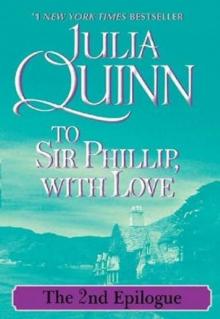 To Sir Phillip, with Love: The Epilogue II
To Sir Phillip, with Love: The Epilogue II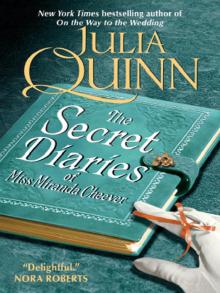 The Secret Diaries of Miss Miranda Cheevers
The Secret Diaries of Miss Miranda Cheevers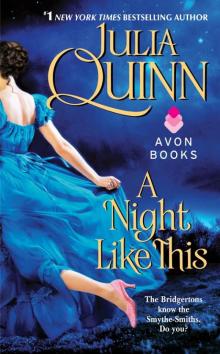 A Night Like This (Smythe-Smith Quartet)
A Night Like This (Smythe-Smith Quartet)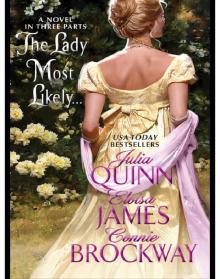 The Lady Most Likely...
The Lady Most Likely...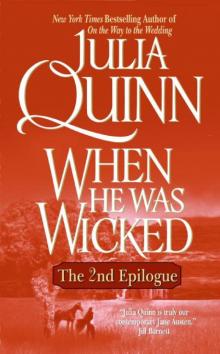 Bridgerton 06: 2nd Epilogue - When He Was Wicked
Bridgerton 06: 2nd Epilogue - When He Was Wicked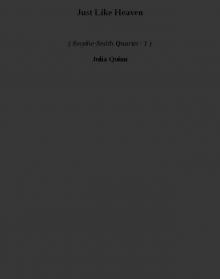 Just Like Heaven sq-1
Just Like Heaven sq-1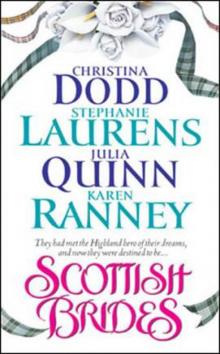 Gretna Greene
Gretna Greene